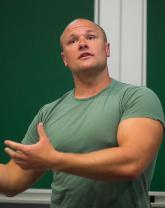Exoplanet Atmospheres
TalkScience Topic: Planetary Climate
5th Shaw-IAU Workshop
Thursday Nov. 30, 2023
UTC: 6:35 p.m. - 6:55 p.m.
Friday Dec. 1, 2023
UTC: 10:05 a.m. - 10:25 a.m.
Planets are everywhere! Since the detection of the first planet beyond the solar system we have learned that they are both ubiquitous and diverse ranging from extremely hot gas giant planets (hot Jupiters) to planets potentially able to host life (e.g.,Trappist-1e). However, how do we detect and study these distant worlds? In this talk I will detail how we explore the atmospheres of distant planets. Through combining simulations (for example,3D climate models as visualised in Fig 1.) to comparison with cutting-edge observations (as shown in Figure 2), we can learn about planet formation and evolution in general but also take lessons home to Earth, to improve our understanding of our own changing climate.
About Nathan Mayne
I grew up in Camborne in Cornwall on a small farm, and much of my youth was spent surfing, playing sport or finding interesting ways to injure myself. At school I always enjoyed complex problems, although I spent most of my early life trying to deny this or cover it up! I never owned a telescope and had no idea what a degree or PhD really was, but I did have a lot of books about space and space exploration. Strangely, I never wanted to be an astronaut, or work out how the rockets worked. However, I was always fascinated at how a huge range of environments across our universe could be realised maintaining the same underlying principles-Physics! Of course, I really would not have phrased it like that back then, probably more like: hmm planets and stars are cool. I went to school at Pool School and Community College, and completed my A-levels there too, before taking a year out working in a DIY store and travelling within Europe. At University, in Exeter, I really started to realise (towards the end of the course) that I was in fact a whole and actual geek. It took a while to come to terms with, but I gradually realised the potential for Physics, and astrophysics in particular to provide a steady stream of unsolved, hugely complicated problems! I completed an Mphys degree specialising in Surface Plasmon Polariton working with Prof. B Barnes, then took at year out working for 6 months at the University of Exeter Sports Park then travelling for the remainder of the year to Malaysia, Australia and New Zealand. After this I completed a PhD on stellar ages with Prof. T. Naylor, before working with Prof. T. Harries on radiative transfer. Finally, I found a home working on planetary atmospheres with Prof. I Baraffe, before becoming a lecturer and leading my own group in this field.





